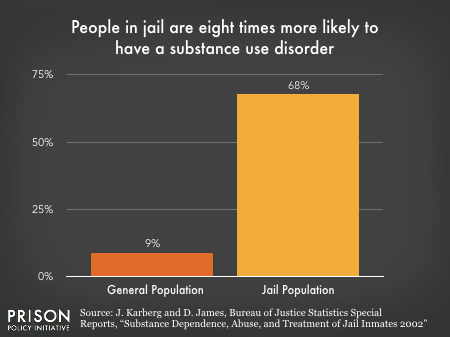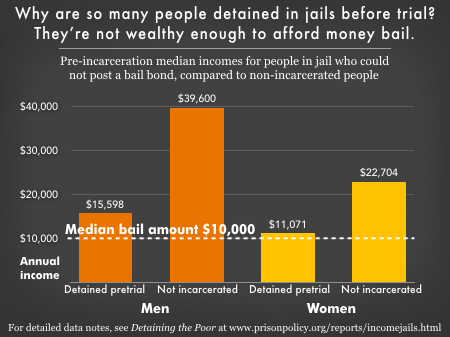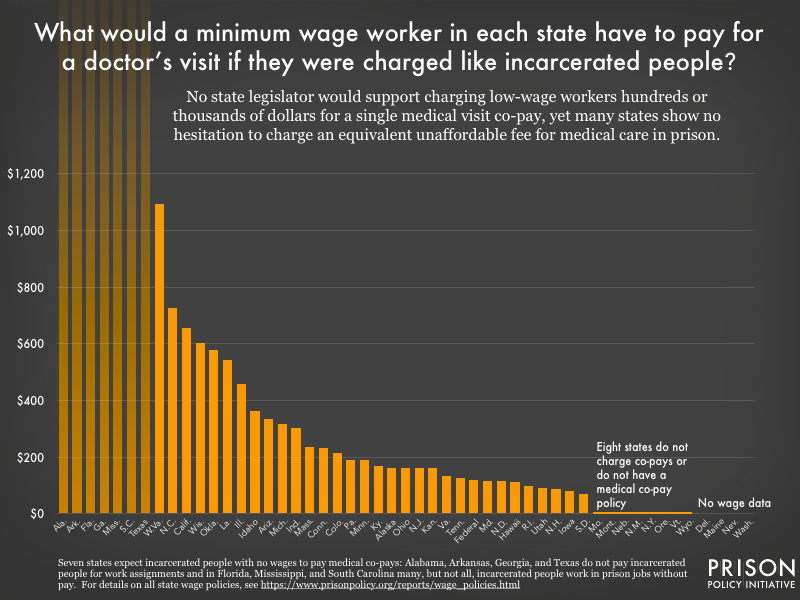Why haven’t presidential candidates proposed to end the criminalization of poverty?
The Democratic candidates are missing an opportunity to pitch sweeping criminal justice reform as an economic justice issue.
by Wanda Bertram, June 12, 2019
Multiple Democratic presidential candidates have staked their campaigns on promises to fight for economic justice and protect low-income people from ruin. So it’s mysterious and frustrating that none of these candidates have proposed to end our justice system’s criminalization of poverty – at least beyond the occasional nod to ending money bail.
These candidates are missing an opportunity. The incomes of people in U.S. prisons and local jails are overwhelmingly low, and one in two American adults has had a close relative incarcerated, meaning that a candidate who understands the criminalization of poverty could propose transformative reforms and speak to a huge number of voters. In particular, candidates are missing an opportunity to speak to Black voters, who are hit hardest by policies that punish poor people.
To be sure, many Democratic candidates have alluded to economic inequality in connection with criminal justice reform — and Bernie Sanders even uses the phrase “criminalizing poverty” on his campaign website — but I’ve seen no indication that any of the candidates can speak to either the specifics or the scale of this problem. Candidates must go beyond criticizing money bail, and promise to end the unequal treatment of poor people at every stage of the justice process:

1. End poverty-related arrests and jail bookings. Far too many Americans who can’t afford housing, drug treatment or mental health services are instead arrested on minor charges related to their homelessness or illness. Many others end up in jail because they can’t afford burdensome fines and fees. An unfortunate downstream effect is jail overcrowding, which leads counties – largely in rural areas – to spend public money on harmful jail expansion rather than social welfare.
Presidential candidates should commit to helping state and local governments shift their priorities, making it easier to support low-income people and harder to jail them:
- Equip cities and towns with universal housing, mental health services, and drug treatment, and invest in public schools and after-school programs in cash-strapped school districts.
- Whenever appropriate, redirect federal funding for county jail expansion to instead fund these critical public goods.
- Decriminalize possession and low-level sales of all drugs, and expunge the criminal records of people convicted of these offenses.
- Incentivize states to decriminalize behaviors stemming from homelessness, such as sleeping outside.
- Stop county courts from imposing fees without first considering one’s ability to pay, and incentivize states to abolish court-imposed fees and discharge all fee debt.
2. Guarantee poor people equal justice before trial. Two major injustices — pretrial detention and lack of access to counsel — ensure that low-income people are disproportionately convicted. Pretrial detention doesn’t just make defendants more likely to plead guilty; it also puts them at risk of losing their jobs and homes, and imposes huge costs on their families, before they’re ever convicted.

Candidates should promise to:
- Ensure that local public defender systems are fully funded, that they no longer charge co-pays to defendants, and that counsel is guaranteed at any hearing that could result in detention.
- Incentivize counties to drastically reduce pretrial detention by ending commercial money bail, and replacing it with release on recognizance, unsecured bonds, and other alternatives.
- Use the power of the Federal Communications Commission to regulate the cost of phone calls from jail, which can strain public defenders’ resources, not to mention those of family members.
- Subsidize county-level pretrial services to help low-income people make their court dates, such as text reminders and free childcare at court.
3. Stop forcing low-income families to subsidize the prison system. When someone goes to prison, their loved ones become their source of financial support. The financial pressure on these families grows when prisons fail to provide basic services, often driving families into debt. It shouldn’t be on relatives — disproportionately women — to pay for phone calls, medical care, nutritious food and educational resources for those behind bars, often when they’ve just lost a breadwinner.

Presidential candidates should commit to paying for incarcerated people’s needs to lift this burden on families:
- End the Medicaid exception for people in prison, and abolish all charges for doctor visits and over-the-counter medication. Ensure that all federal and state prisons offer medication-assisted opioid treatment.
- Incentivize states and counties to pay for the cost of phone calls, email, and other technologies that allow incarcerated people to stay connected to their families.
- Use the muscle of federal agencies like the Consumer Financial Protection Bureau and Federal Trade Commission to regulate the market for prison services, such as money transfer services (which currently charge families exorbitant deposit fees).
- Restore Pell Grants to incarcerated people, and fully fund in-prison programs granting high school and college degrees.
- Require state departments of correction to provide nutritious meals that meet daily caloric requirements, instead of forcing incarcerated people to supplement their meals by buying from the prison commissary.
4. Protect people from going back to prison just because they’re poor. Incarcerated people who come from under-resourced neighborhoods tend to return to those same neighborhoods after prison, now saddled with criminal records and far poorer than before.
Presidential candidates should avoid old narratives about how more surveillance, monitoring and job training are needed to “reduce recidivism” among people leaving prison. Instead, they should call the reentry process what it is: a period of extreme vulnerability that mostly affects impoverished people, and that can’t be improved without serious investments in formerly incarcerated people’s welfare. They should commit to:
- Identify the communities to which most formerly incarcerated people return, and subsidize additional low-income housing, drug treatment and mental health services in those communities.
- Help states create Departments of Reentry that connect people nearing release to permanent housing, medical care, and other resources.
- Incentivize states to pass laws expanding criminal record expungement, including automatic expungement for people convicted of minor offenses.
- End the harmful restrictions on association that prohibit formerly incarcerated people from helping each other rebuild their lives.
- Restore welfare benefits, including housing assistance, to people with criminal records.
- Urge states to abolish probation and parole fees, including fees for ankle monitors. End so-called “pay-only” probation schemes, which extract fees without providing any “services” at all.
- Incentivize states to “ban the box” on job applications, and to end restrictions on occupational licenses that lock people with criminal records out of good jobs.
- Expand federal tax benefits for businesses that hire people with criminal records.
- Incentivize states to end laws suspending driver’s licenses for non-driving offenses.
To be sure, there are many other policy changes that could help end the criminalization of poverty; this list is only a starting point. But it should be alarming that most of these policy options have gone unmentioned by any presidential candidate. Until the candidates commit to ending our criminal justice system’s abuse of poor people from arrest to release (and afterwards), their visions for economic justice won’t be complete.



